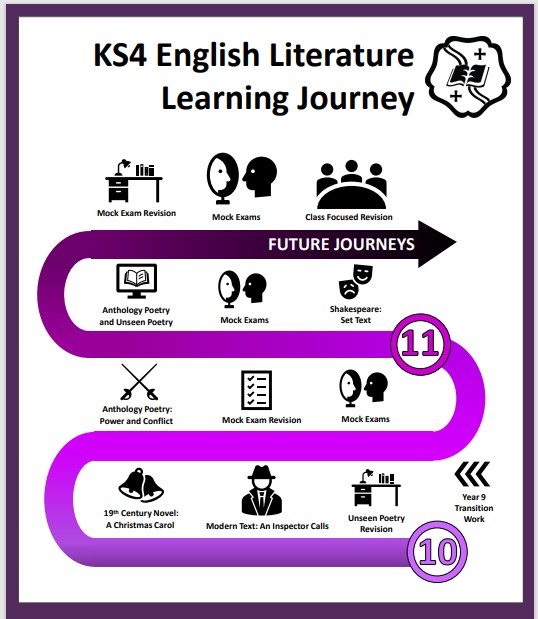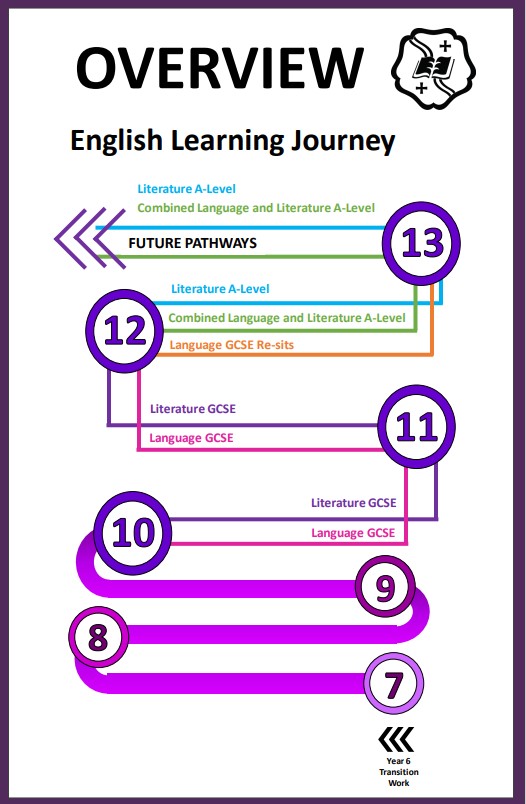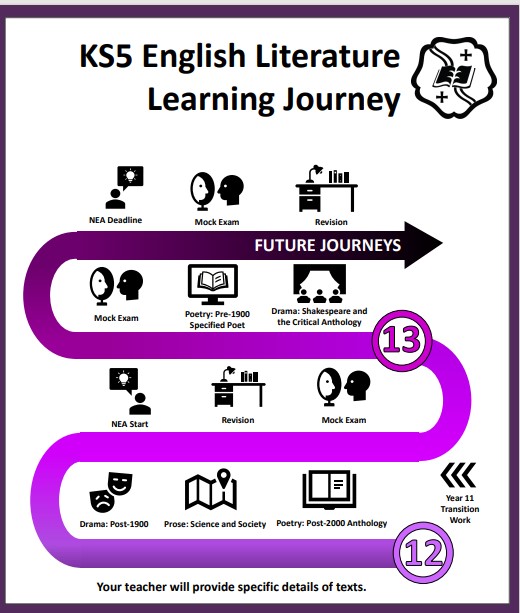English holds a central place in the
curriculum as language is power: it underpins all learning. We aim for our
students to develop critical awareness, the ability to craft their writing, an
appreciation of literature, and the confidence to articulate their ideas. We
use language and literature to explore and nurture life skills such as
resilience, self-expression and creativity. Students will become more empathic
and tolerant through encountering a range of texts that allow students to think
beyond their own time and place. Through the subjects offered by the English
department, our students will be empowered to explore, understand and question
the world, people, and themselves.
Studying English Literature encourages students to develop knowledge and skills in reading, writing and critical thinking. Through literature, students develop their cultural awareness and experience a range of influential writers. The specification enables students of all abilities to develop the skills they need to read, understand and analyse a wide range of different texts covering the 19th, 20th and 21st century time periods. In addition, students will develop their ability to write clearly, coherently and accurately using a range of vocabulary and sentence structures.
Exam Board: AQA
Qualification Title: English Literature
Qualification Specification Code: 8702
Qualification Webpage: Click here to visit the AQA webpage for the specification.
English Literature is a mandatory course to study at GCSE. It will also benefit your other studies at GCSE, through developing your skills of empathy and insight into a range of cultures and societies.
AO1: To be able to maintain a critical style and develop an informed personal response to a text. To use textual references, including quotations, to support and illustrate interpretations.
AO2: To analyse the language, form and structure used by a writer to create meanings and effects.
AO3:To show understanding of the relationships between texts and the contexts in which they were written.
AO4: To be able to use a range of vocabulary and sentence structures for clarity, purpose and effect, with accurate spelling and punctuation.


Paper 1 (40%): Shakespeare and the 19th-century novel
1hr45
64 marks in total.
Section A Shakespeare: students will answer one question on the play they have studied. They will be required to write in detail about an extract from the play and then to write about the play as a whole.
Section B The 19th-century novel: students will answer one question on the novel they have studied. They will be required to write in detail about an extract from the novel and then to write about the novel as a whole.
Paper 2 (60%): Modern texts and poetry
2hr15
96 marks in total.
Section A Modern texts: students will answer one essay question from a choice of two on their studied modern prose or drama text.
Section B Poetry: students will answer one comparative question on one named poem printed on the paper and one other poem from the Power & Conflict anthology cluster.
Section C Unseen poetry: Students will answer one question on one unseen poem and one question comparing this poem with a second unseen poem.
Writer – Creative writer, travel writer, children’s writer…
Historian
Journalist
Careers working within PR, marketing, advertising
Teacher – English Language specialist
Linguistic specialist
Translator
Copy-writer
Editor
Solicitor/Lawyer
Graphic Designer
Politician
Brand Consultant
Motivational Speaker
Researcher
Librarian
Jobs within publishing
University Lecturer – specialising in a genre of Literature
This course is
designed to enable students to become confident and reflective readers and is a
fantastic way to fuel a passion for literature. Students learn to use critical
concepts and terminology with understanding and discrimination. They are
encouraged to reflect on their own responses to texts, consider interpretations
by other readers and develop awareness of the contexts in which texts were
written. Using detailed knowledge and understanding of individual texts,
students will explore comparisons and links between them, appreciating the
significance of cultural and historical influences upon readers and writers. A
variety of study methods are used, and we encourage students to be active
participants. The non-examination assessment is an opportunity to follow
personal interests and passions. It promotes the skills needed for independent
study at University level in a supportive environment. This course requires an
enjoyment of reading and the curiosity to explore beyond the set texts.
Provide students with the opportunity to explore an academic range of texts and skills that will help with careers and higher study in English and the wider curriculum. Educate students to be able to engage critically with texts on an exploratory and analytical level. Support students in being able to manage time and organisational elements with research, essay writing and extended projects (in particular the non-examination assessment). Inspire students to become adults who are curious about the world and willing to challenge ideas. Promote independent learning in the subject area and beyond. Enable students to become sophisticated and effective communicators. Using the curricula, introduce new concepts; build on prior learning to revisit and improve skills; promote the development of all three literacy strands; explicitly promote stretch and challenge through the years. All this is underpinned with personalised assessment and targeted feedback, aligned with key learning objectives. Inspire and enhance student understanding further by offering extra-curricular opportunities with a focus on extending knowledge and experience, and encouraging personal investigation. Provide personalised advice and guidance to support students’ wider learning and aspirations beyond KS5.
Exam Board: Edexcel
Qualification Title: English Literature
Qualification Specification Code: 9ET0
Qualification Webpage: Click here to visit the Edexcel webpage for the specification.
Standard Sixth Form entry requirements
plus a strong enjoyment of independent reading and writing.


A Level English
Literature opens up wide and varied pathways for your future. You may choose to
undertake an English Literature degree or study for careers in areas such as
law, journalism, teaching, public relations, advertising, social work, the
civil service, theatre, film or writing. A level English Literature supports
all careers where spoken and written communication skills are important. In
addition, the subject develops critical thinking skills and the ability to
craft evidence-based independent opinions and judgements. It is therefore
extremely helpful for a wide range of careers, both vocational and practical.
This is the most appropriate course to take for students who are considering
further study of English Literature at university.
Mrs Guerrini
Owned by: MDS | Last Published: 20/09/2019 09:53:36 | Next Update: N/A